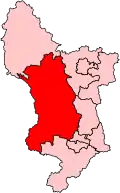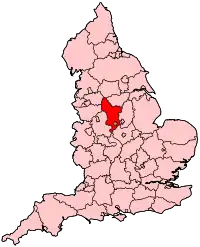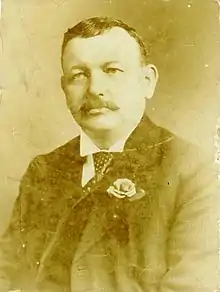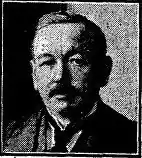| West Derbyshire | |
|---|---|
| Former County constituency for the House of Commons | |
 Boundary of West Derbyshire in Derbyshire for the 2005 general election | |
 Location of Derbyshire within England | |
| County | Derbyshire |
| Major settlements | Bakewell, Matlock, Wirksworth |
| 1885–2010 | |
| Seats | One |
| Created from | North Derbyshire |
| Replaced by | Derbyshire Dales |
West Derbyshire was a county constituency represented in the House of Commons of the Parliament of the United Kingdom. From 1885, until it was replaced by the Derbyshire Dales constituency in the 2010 general election, it elected one Member of Parliament (MP) by the first past the post voting system. It was a safe Conservative seat for most of its existence.
Boundaries
This was the only really safe Conservative seat in Derbyshire, consisting mostly of rural villages and tourist towns like Bakewell and Matlock; Labour's only strengths were in Wirksworth and Masson, not enough to end the long-standing Conservative representation of this seat.
Boundary review
Following their review of parliamentary representation in Derbyshire, the Boundary Commission for England created a new constituency of Derbyshire Dales based on the existing West Derbyshire constituency.
History
Historically associated with the Cavendish family, the seat and its predecessors were usually represented by one of the future Dukes of Devonshire or their relatives from 1580 until the Second World War. When the Cavendish family left the Liberals over Irish Home Rule the seat stayed loyal to them as they sat first as Liberal Unionists then as Conservatives. In 1918 the hold on the constituency was briefly broken by Charles Frederick White standing for the Liberals, but the seat was regained in 1923. In a by-election in 1944, White's son, also called Charles Frederick White resigned as the official Labour nominee in order to stand against the wartime party truce. He defeated the Conservative candidate, William Cavendish, Marquess of Hartington, and subsequently took the Labour whip in the Commons, holding the seat in the 1945 general election for Labour. The Conservatives regained the seat in the 1950 general election and have held it ever since. The closest they have come to losing was in the 1986 by-election when they held it by only 100 votes in a period of heavy unpopularity for the government of Margaret Thatcher.
Members of Parliament
Elections
Elections in the 1880s
| Party | Candidate | Votes | % | ±% | |
|---|---|---|---|---|---|
| Liberal | Edward Cavendish | 5,020 | 54.8 | ||
| Conservative | Frederic Charles Arkwright | 4,138 | 45.2 | ||
| Majority | 882 | 9.6 | |||
| Turnout | 9,158 | 88.8 | |||
| Registered electors | 10,310 | ||||
| Liberal win (new seat) | |||||
| Party | Candidate | Votes | % | ±% | |
|---|---|---|---|---|---|
| Liberal Unionist | Edward Cavendish | Unopposed | |||
| Liberal Unionist gain from Liberal | |||||
Elections in the 1890s
| Party | Candidate | Votes | % | ±% | |
|---|---|---|---|---|---|
| Liberal Unionist | Victor Cavendish | Unopposed | |||
| Liberal Unionist hold | |||||
| Party | Candidate | Votes | % | ±% | |
|---|---|---|---|---|---|
| Liberal Unionist | Victor Cavendish | 5,961 | 68.3 | N/A | |
| Liberal | Hugh MacDermot | 2,768 | 31.7 | New | |
| Majority | 3,193 | 36.6 | N/A | ||
| Turnout | 8,729 | 73.0 | N/A | ||
| Registered electors | 11,956 | ||||
| Liberal Unionist hold | Swing | N/A | |||
| Party | Candidate | Votes | % | ±% | |
|---|---|---|---|---|---|
| Liberal Unionist | Victor Cavendish | Unopposed | |||
| Liberal Unionist hold | |||||
Elections in the 1900s
| Party | Candidate | Votes | % | ±% | |
|---|---|---|---|---|---|
| Liberal Unionist | Victor Cavendish | Unopposed | |||
| Liberal Unionist hold | |||||
| Party | Candidate | Votes | % | ±% | |
|---|---|---|---|---|---|
| Liberal Unionist | Victor Cavendish | Unopposed | |||
| Liberal Unionist hold | |||||
| Party | Candidate | Votes | % | ±% | |
|---|---|---|---|---|---|
| Liberal Unionist | Victor Cavendish | 5,283 | 52.8 | N/A | |
| Liberal | Edward Hinmers | 4,724 | 47.2 | New | |
| Majority | 559 | 5.6 | N/A | ||
| Turnout | 10,007 | 87.5 | N/A | ||
| Registered electors | 11,443 | ||||
| Liberal Unionist hold | Swing | N/A | |||
| Party | Candidate | Votes | % | ±% | |
|---|---|---|---|---|---|
| Liberal Unionist | Henry Petty-Fitzmaurice | Unopposed | |||
| Liberal Unionist hold | |||||
Elections in the 1910s
| Party | Candidate | Votes | % | ±% | |
|---|---|---|---|---|---|
| Liberal Unionist | Henry Petty-Fitzmaurice | 5,974 | 54.8 | +2.0 | |
| Liberal | Edward Hinmers | 4,925 | 45.2 | −2.0 | |
| Majority | 1,049 | 9.6 | +4.0 | ||
| Turnout | 10,899 | 91.1 | +3.6 | ||
| Registered electors | 11,962 | ||||
| Liberal Unionist hold | Swing | +2.0 | |||

| Party | Candidate | Votes | % | ±% | |
|---|---|---|---|---|---|
| Liberal Unionist | Henry Petty-Fitzmaurice | 5,624 | 55.2 | +0.4 | |
| Liberal | Charles White | 4,564 | 44.8 | −0.4 | |
| Majority | 1,060 | 10.4 | +0.8 | ||
| Turnout | 10,188 | 85.2 | −5.9 | ||
| Registered electors | 11,962 | ||||
| Liberal Unionist hold | Swing | +0.4 | |||
General Election 1914–15:
Another General Election was required to take place before the end of 1915. The political parties had been making preparations for an election to take place and by the July 1914, the following candidates had been selected;
- Unionist:Henry Petty-Fitzmaurice
- Liberal: Charles White

| Party | Candidate | Votes | % | ±% | |
|---|---|---|---|---|---|
| Liberal | Charles White | 10,752 | 55.6 | +10.8 | |
| C | Unionist | Henry Petty-Fitzmaurice | 8,592 | 44.4 | −10.8 |
| Majority | 2,160 | 11.2 | N/A | ||
| Turnout | 19,344 | 66.0 | −19.2 | ||
| Registered electors | 29,323 | ||||
| Liberal gain from Unionist | Swing | +10.8 | |||
| C indicates candidate endorsed by the coalition government. | |||||
Elections in the 1920s
| Party | Candidate | Votes | % | ±% | |
|---|---|---|---|---|---|
| Liberal | Charles White | 13,060 | 50.2 | −5.4 | |
| Unionist | Edward Cavendish | 12,973 | 49.8 | +5.4 | |
| Majority | 87 | 0.4 | −10.8 | ||
| Turnout | 26,033 | 86.1 | +20.1 | ||
| Registered electors | 30,231 | ||||
| Liberal hold | Swing | −5.4 | |||
| Party | Candidate | Votes | % | ±% | |
|---|---|---|---|---|---|
| Unionist | Edward Cavendish | 13,419 | 50.9 | +1.1 | |
| Liberal | William Christopher Mallison | 12,966 | 49.1 | −1.1 | |
| Majority | 453 | 1.8 | N/A | ||
| Turnout | 26,385 | 84.9 | −1.2 | ||
| Registered electors | 31,067 | ||||
| Unionist gain from Liberal | Swing | +1.1 | |||
| Party | Candidate | Votes | % | ±% | |
|---|---|---|---|---|---|
| Unionist | Edward Cavendish | 15,324 | 56.9 | +6.0 | |
| Liberal | William Christopher Mallison | 11,612 | 43.1 | −6.0 | |
| Majority | 3,712 | 13.8 | +12.0 | ||
| Turnout | 26,936 | 84.8 | −0.1 | ||
| Registered electors | 31,757 | ||||
| Unionist hold | Swing | +6.0 | |||
| Party | Candidate | Votes | % | ±% | |
|---|---|---|---|---|---|
| Unionist | Edward Cavendish | 16,760 | 49.7 | −7.2 | |
| Liberal | William Christopher Mallison | 13,277 | 39.4 | −3.7 | |
| Labour | William Wilkinson | 3,660 | 10.9 | New | |
| Majority | 3,483 | 10.3 | −3.5 | ||
| Turnout | 33,697 | 83.2 | −1.6 | ||
| Registered electors | 40,487 | ||||
| Unionist hold | Swing | −1.8 | |||
Elections in the 1930s
| Party | Candidate | Votes | % | ±% | |
|---|---|---|---|---|---|
| Conservative | Edward Cavendish | Unopposed | N/A | N/A | |
| Conservative hold | Swing | ||||
| Party | Candidate | Votes | % | ±% | |
|---|---|---|---|---|---|
| Conservative | Edward Cavendish | Unopposed | N/A | N/A | |
| Conservative hold | Swing | ||||
| Party | Candidate | Votes | % | ±% | |
|---|---|---|---|---|---|
| Conservative | Henry Hunloke | 16,740 | 48.6 | N/A | |
| Labour | Charles White | 11,216 | 32.5 | New | |
| Liberal | Milner Gray | 6,515 | 18.9 | New | |
| Majority | 5,524 | 16.1 | N/A | ||
| Turnout | 34,471 | 79.4 | N/A | ||
| Conservative hold | Swing | ||||
General Election 1939–40
Another General Election was required to take place before the end of 1940. The political parties had been making preparations for an election to take place from 1939 and by the end of this year, the following candidates had been selected;
- Conservative: Henry Hunloke
- Labour: Charles White
- Liberal: James Ivor Waddington[10]
Elections in the 1940s
| Party | Candidate | Votes | % | ±% | |
|---|---|---|---|---|---|
| Independent Labour | Charles White | 16,336 | 57.7 | N/A | |
| Conservative | Marquess of Hartington | 11,775 | 41.5 | N/A | |
| Agriculturalist | Robert Goodall | 233 | 0.8 | New | |
| Majority | 4,561 | 16.2 | N/A | ||
| Turnout | 28,344 | 65.4 | N/A | ||
| Independent Labour gain from Conservative | Swing | ||||
| Party | Candidate | Votes | % | ±% | |
|---|---|---|---|---|---|
| Labour | Charles White | 18,331 | 48.8 | +16.3 | |
| Conservative | William Aitken | 18,175 | 48.4 | −0.2 | |
| Agriculturalist | Robert Goodall | 1,068 | 2.8 | N/A | |
| Majority | 156 | 0.4 | N/A | ||
| Turnout | 37,574 | 81.7 | +2.3 | ||
| Labour gain from Conservative | Swing | ||||
Elections in the 1950s
| Party | Candidate | Votes | % | ±% | |
|---|---|---|---|---|---|
| Conservative | Edward Wakefield | 20,015 | 51.9 | +3.5 | |
| Labour | N. Gratton | 13,478 | 35.0 | −13.8 | |
| Liberal | George Frederick Strange | 5,070 | 13.2 | New | |
| Majority | 6,537 | 16.9 | N/A | ||
| Turnout | 33,563 | 87.5 | +5.8 | ||
| Conservative gain from Labour | Swing | ||||
| Party | Candidate | Votes | % | ±% | |
|---|---|---|---|---|---|
| Conservative | Edward Wakefield | 22,223 | 58.8 | +6.9 | |
| Labour | Ronald Lewis | 15,578 | 41.2 | +6.2 | |
| Majority | 6,645 | 17.6 | +0.7 | ||
| Turnout | 37,801 | 84.4 | −3.1 | ||
| Conservative hold | Swing | ||||
| Party | Candidate | Votes | % | ±% | |
|---|---|---|---|---|---|
| Conservative | Edward Wakefield | 21,052 | 59.6 | +0.8 | |
| Labour | Robert B. Stirling | 14,296 | 40.4 | −0.8 | |
| Majority | 6,756 | 19.2 | +1.6 | ||
| Turnout | 35,348 | 80.0 | −4.4 | ||
| Conservative hold | Swing | ||||
| Party | Candidate | Votes | % | ±% | |
|---|---|---|---|---|---|
| Conservative | Edward Wakefield | 22,034 | 61.3 | +1.7 | |
| Labour | Albert E. Kitts | 13,925 | 38.7 | −1.7 | |
| Majority | 8,109 | 22.6 | +3.5 | ||
| Turnout | 35,959 | 82.0 | +2.0 | ||
| Conservative hold | Swing | ||||
Elections in the 1960s
| Party | Candidate | Votes | % | ±% | |
|---|---|---|---|---|---|
| Conservative | Aidan Crawley | 12,455 | 36.0 | −25.3 | |
| Liberal | Ronald Gardner-Thorpe | 11,235 | 32.5 | New | |
| Labour | John Dilks | 9,431 | 27.2 | −11.5 | |
| Independent | Raymond Gregory | 1,433 | 4.1 | New | |
| Majority | 1,220 | 3.5 | −19.1 | ||
| Turnout | 34,554 | ||||
| Conservative hold | Swing | ||||
| Party | Candidate | Votes | % | ±% | |
|---|---|---|---|---|---|
| Conservative | Aidan Crawley | 16,825 | 44.2 | −18.1 | |
| Liberal | Ronald Gardner-Thorpe | 11,559 | 30.4 | N/A | |
| Labour | John Dilks | 9,669 | 25.4 | −13.3 | |
| Majority | 5,266 | 13.8 | −8.8 | ||
| Turnout | 38,053 | 85.8 | +3.8 | ||
| Conservative hold | Swing | ||||
| Party | Candidate | Votes | % | ±% | |
|---|---|---|---|---|---|
| Conservative | Aidan Crawley | 18,383 | 49.6 | +5.4 | |
| Labour | Phillip Whitehead | 13,791 | 37.2 | +11.8 | |
| Liberal | Peggy Edwards | 4,874 | 13.2 | −17.2 | |
| Majority | 4,592 | 12.4 | −1.4 | ||
| Turnout | 37,048 | 83.4 | −2.4 | ||
| Conservative hold | Swing | ||||
| Party | Candidate | Votes | % | ±% | |
|---|---|---|---|---|---|
| Conservative | James Scott-Hopkins | 16,319 | 56.7 | +7.1 | |
| Liberal | Michael Aza Pinney | 5,696 | 19.8 | +6.6 | |
| Labour | Robin Corbett | 5,284 | 18.3 | −18.9 | |
| Independent | Robert Goodall | 1,496 | 5.2 | New | |
| Majority | 10,623 | 36.9 | +24.5 | ||
| Turnout | 28,795 | 64.5 | −18.9 | ||
| Conservative hold | Swing | ||||
Elections in the 1970s
| Party | Candidate | Votes | % | ±% | |
|---|---|---|---|---|---|
| Conservative | James Scott-Hopkins | 22,692 | 61.9 | +12.3 | |
| Labour | Fred Inglis | 13,976 | 38.1 | +0.9 | |
| Majority | 8,716 | 23.8 | +11.4 | ||
| Turnout | 36,668 | 76.7 | −6.7 | ||
| Conservative hold | Swing | ||||
| Party | Candidate | Votes | % | ±% | |
|---|---|---|---|---|---|
| Conservative | James Scott-Hopkins | 19,941 | 48.7 | −13.2 | |
| Liberal | Peter Worboys | 11,481 | 28.0 | New | |
| Labour | Fred Inglis | 9,529 | 23.3 | −14.8 | |
| Majority | 8,460 | 20.7 | −3.1 | ||
| Turnout | 40,951 | 61.8 | −14.9 | ||
| Conservative hold | Swing | ||||
| Party | Candidate | Votes | % | ±% | |
|---|---|---|---|---|---|
| Conservative | James Scott-Hopkins | 18,468 | 47.9 | −0.8 | |
| Liberal | Peter Worboys | 10,622 | 27.6 | −0.4 | |
| Labour | David Townsend | 9,456 | 24.5 | +1.2 | |
| Majority | 7,846 | 20.3 | −0.4 | ||
| Turnout | 38,546 | 57.6 | −4.2 | ||
| Conservative hold | Swing | ||||
| Party | Candidate | Votes | % | ±% | |
|---|---|---|---|---|---|
| Conservative | Matthew Parris | 21,478 | 52.6 | +4.7 | |
| Liberal | Peter Worboys | 11,261 | 27.6 | 0.0 | |
| Labour | William Moore | 8,134 | 19.9 | −4.6 | |
| Majority | 10,217 | 25.0 | +4.7 | ||
| Turnout | 40,873 | 80.7 | +23.1 | ||
| Conservative hold | Swing | ||||
Elections in the 1980s
| Party | Candidate | Votes | % | ±% | |
|---|---|---|---|---|---|
| Conservative | Matthew Parris | 29,695 | 55.9 | +3.3 | |
| Liberal | Viv Bingham | 14,370 | 27.0 | −0.6 | |
| Labour | John March | 9,060 | 17.1 | −2.8 | |
| Majority | 15,325 | 28.9 | +3.9 | ||
| Turnout | 53,125 | 77.4 | −3.3 | ||
| Conservative hold | Swing | ||||
| Party | Candidate | Votes | % | ±% | |
|---|---|---|---|---|---|
| Conservative | Patrick McLoughlin | 19,896 | 39.5 | −16.4 | |
| Liberal | Christopher Walmsley | 19,796 | 39.4 | +12.4 | |
| Labour | William Moore | 9,952 | 19.8 | +2.7 | |
| Rainbow Dream Ticket | R. C. Sidwell | 348 | 0.7 | New | |
| Independent | Robert Goodall | 289 | 0.6 | New | |
| Majority | 100 | 0.1 | −28.8 | ||
| Turnout | 50,281 | 71.9 | −5.5 | ||
| Conservative hold | Swing | ||||
| Party | Candidate | Votes | % | ±% | |
|---|---|---|---|---|---|
| Conservative | Patrick McLoughlin | 31,224 | 53.1 | −2.8 | |
| Liberal | Christopher Walmsley | 20,697 | 35.2 | +8.2 | |
| Labour | William Moore | 6,875 | 11.7 | −5.4 | |
| Majority | 10,527 | 17.9 | −11.0 | ||
| Turnout | 58,796 | 83.1 | +5.7 | ||
| Conservative hold | Swing | ||||
Elections in the 1990s
| Party | Candidate | Votes | % | ±% | |
|---|---|---|---|---|---|
| Conservative | Patrick McLoughlin | 32,879 | 54.3 | +1.2 | |
| Liberal Democrats | RD Fearn | 14,110 | 23.3 | −11.9 | |
| Labour | Stephen J Clamp | 13,528 | 22.4 | +10.7 | |
| Majority | 18,769 | 31.0 | +13.1 | ||
| Turnout | 60,517 | 85.0 | +1.9 | ||
| Conservative hold | Swing | +6.6 | |||
| Party | Candidate | Votes | % | ±% | |
|---|---|---|---|---|---|
| Conservative | Patrick McLoughlin | 23,945 | 42.1 | ||
| Labour | Stephen J Clamp | 19,060 | 33.5 | ||
| Liberal Democrats | Christopher Seeley | 9,940 | 17.5 | ||
| Referendum | John Gouriet | 2,499 | 4.4 | New | |
| Independent Green | Godfrey Meynell | 593 | 1.0 | New | |
| UKIP | Hugh Price | 484 | 0.9 | New | |
| Monster Raving Loony | "The Flying Brick" Delves | 281 | 0.5 | New | |
| Independent Back to Basics | Martin Kyslun | 81 | 0.1 | New | |
| Majority | 4,885 | 8.6 | |||
| Turnout | 56,883 | 78.2 | |||
| Conservative hold | Swing | ||||
Elections in the 2000s
| Party | Candidate | Votes | % | ±% | |
|---|---|---|---|---|---|
| Conservative | Patrick McLoughlin | 24,280 | 48.0 | +5.9 | |
| Labour | Stephen J Clamp | 16,910 | 33.4 | −0.1 | |
| Liberal Democrats | Jeremy Beckett | 7,922 | 15.7 | −1.8 | |
| UKIP | Stuart Bavester | 672 | 1.3 | +0.4 | |
| Monster Raving Loony | "The Flying Brick" Delves | 472 | 0.9 | +0.4 | |
| Independent | Robert Goodall | 333 | 0.7 | New | |
| Majority | 7,370 | 14.6 | +6.0 | ||
| Turnout | 50,589 | 67.8 | −10.5 | ||
| Conservative hold | Swing | ||||
| Party | Candidate | Votes | % | ±% | |
|---|---|---|---|---|---|
| Conservative | Patrick McLoughlin | 24,378 | 47.7 | −0.3 | |
| Labour | David Menon | 13,625 | 26.6 | −6.8 | |
| Liberal Democrats | Ray Dring | 11,408 | 22.3 | +6.6 | |
| UKIP | Michael Cruddas | 1,322 | 2.6 | +1.3 | |
| Monster Raving Loony | "The Flying Brick" Delves | 405 | 0.8 | −0.1 | |
| Independent | Martin Kyslun | 5 | 0.0 | New | |
| Majority | 10,753 | 21.0 | +6.4 | ||
| Turnout | 51,143 | 69.2 | +1.4 | ||
| Conservative hold | Swing | +3.2 | |||
See also
Notes and references
Craig, F. W. S. (1983). British parliamentary election results 1918–1949 (3 ed.). Chichester: Parliamentary Research Services. ISBN 0-900178-06-X.
- ↑ Leigh Rayment's Historical List of MPs – Constituencies beginning with "D" (part 1)
- 1 2 British Parliamentary Election Results 1885–1918, FWS Craig
- 1 2 3 4 5 6 The Liberal Year Book, 1907
- ↑ Debrett's House of Commons & Judicial Bench, 1886
- 1 2 3 4 5 6 7 Craig, FWS, ed. (1974). British Parliamentary Election Results: 1885-1918. London: Macmillan Press. ISBN 9781349022984.
- 1 2 Debrett's House of Commons & Judicial Bench, 1901
- 1 2 Debrett's House of Commons & Judicial Bench, 1916
- ↑ British Parliamentary Election Results 1918–1949, FWS Craig
- ↑ British parliamentary election results, 1918–1949 by FWS Craig
- ↑ Derby Daily Telegraph, 10 Jan 1938
- ↑ "Election Data 1983". Electoral Calculus. Archived from the original on 15 October 2011. Retrieved 18 October 2015.
- ↑ "Election Data 1987". Electoral Calculus. Archived from the original on 15 October 2011. Retrieved 18 October 2015.
- ↑ "Election Data 1992". Electoral Calculus. Archived from the original on 15 October 2011. Retrieved 18 October 2015.
- ↑ "Politics Resources". Election 1992. Politics Resources. 9 April 1992. Retrieved 6 December 2010.
- ↑ "Election Data 1997". Electoral Calculus. Archived from the original on 15 October 2011. Retrieved 18 October 2015.
- ↑ "Election Data 2001". Electoral Calculus. Archived from the original on 15 October 2011. Retrieved 18 October 2015.
- ↑ "Election Data 2005". Electoral Calculus. Archived from the original on 15 October 2011. Retrieved 18 October 2015.
Sources
- Guardian Unlimited Politics (Election results from 1992 to the present)
- http://www.psr.keele.ac.uk/ (Election results from 1951 to the present)